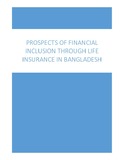| dc.contributor.advisor | Haque, Mr. Shamim Ehsanul | |
| dc.contributor.author | Jewel, Md. Salahuddin | |
| dc.date.accessioned | 2018-01-08T04:25:14Z | |
| dc.date.available | 2018-01-08T04:25:14Z | |
| dc.date.copyright | 2017 | |
| dc.date.issued | 2017-04-23 | |
| dc.identifier.other | ID 12164080 | |
| dc.identifier.uri | http://hdl.handle.net/10361/8959 | |
| dc.description | This internship report is submitted in a partial fulfilment of the requirements for the degree of Masters of Business Administration, 2017. | en_US |
| dc.description | Cataloged from PDF version of internship report. | |
| dc.description | Includes bibliographical references (page 37). | |
| dc.description.abstract | Vulnerability to risk is common in the lives of poor people. From the beginning of
human civilization low income persons have been particularly vulnerable to
environmental risks, chronic illness, shocks of sudden or accidental death, physical
disability, loss of property due to theft or fire, agricultural losses due to natural
disaster, manmade and other disasters.
The objective of the study is to find out the prospects of financial inclusion through
insurance in Bangladesh. To find out the awareness of microinsurance among the
low income group, to know about the current situation of microinsurance in
Bangladesh.
Also finding out the challenges of Financial Inclusion. Finally proposing some
recommendations.
Financial inclusion or inclusive financing is the delivery of financial services at
affordable costs to sections of disadvantaged and low-income segments of society,
in contrast to financial exclusion where those services are not available or affordable.
Microinsurance is the protection of low-income people (those living on between
approximately $1 and $4 per day) against specific perils in exchange for regular
premium payment proportionate to the likelihood and cost of the risks involved.
Current understanding of the specific insurance of low income households is limited.
People are reluctant to give up a portion of their hard-earned income in exchange for
a potential future benefit they hope they will not need. There is a negative perception
of insurance among general people. They don’t think it is useful for them.
Awareness development is very crucial. It is very unfortunate that people who need
insurance need most don’t realize the importance of insurance. NGO/ MFIs,
Insurance companies and all the players in this industry including government should
take steps to develop awareness among low income group.
For building good image of the industry regulators and government has lot to do.
Banks and NBFIs have better reputation among people than insurance companies.
These perception needs to be changed. Otherwise financial inclusion through
insurance will not be fruitful if people are not receiving it right.
The NGOs/MFIs cover different types of risks related to life, health, accident and
also property. In this regard, the insurance companies and NGOs/MFIs can work
jointly. Moreover, the both parties can form a separate Mutual entity operated as
Mutual Insurance Company to expand their Microinsurance product line. | en_US |
| dc.description.statementofresponsibility | Md. Salahuddin Jewel | |
| dc.format.extent | 39 pages | |
| dc.language.iso | en | en_US |
| dc.publisher | BRAC Univeristy | en_US |
| dc.rights | BRAC University Internship reports are protected by copyright. They may be viewed from this source for any purpose, but reproduction or distribution in any format is prohibited without written permission. | |
| dc.subject | Financial inclusion | en_US |
| dc.subject | Life insurance | en_US |
| dc.subject | Microinsurance | en_US |
| dc.title | Prospects of financial inclusion through life insurance in Bangladesh | en_US |
| dc.type | Internship report | en_US |
| dc.contributor.department | BRAC Business School, BRAC University | |
| dc.description.degree | M. Business Administration | |

